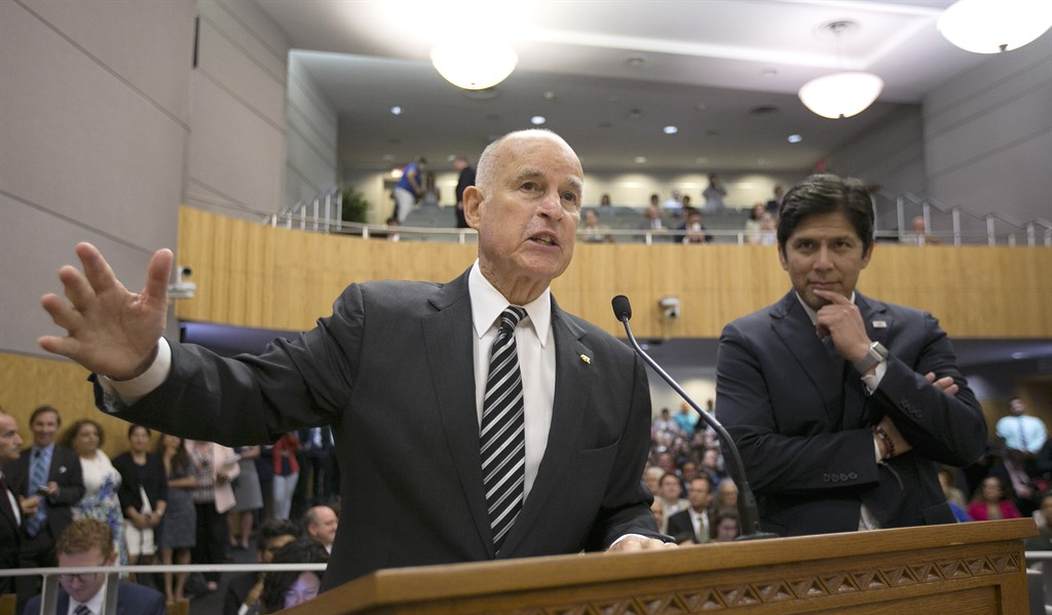Monday California Governor Jerry Brown reached an agreement with California Senate leader Kevin de León which will make California a “sanctuary state.” The bill, known as SB54, is designed to create a legal wall of sorts between illegal immigrants and U.S. immigration authorities.
As originally submitted by de León earlier this year the bill would have prevented ICE from interviewing people about their legal status in the state’s jails and prisons, even if they had been arrested for a violent crime. However, strong opposition from state law enforcement officials had an impact. In March Sacramento County Sheriff Scott Jones told reporters, “If SB 54 passes, it will allow dangerous, violent career criminals to slip through the cracks and be released back into our communities.”
Governor Brown apparently heard those complaints and convinced de León to water down his original version of the bill in exchange for his guarantee he would sign it. The Mercury News reports on what the bill does and doesn’t allow:
The latest version of Senate Bill 54 would allow federal immigration officers to interview people in custody — though they can no longer have permanent office space in jails, according to information provided by Senate Leader Kevin de León’s office, who wrote the bill. The changes also would exclude state prisons from many of the requirements and would expand the list of crimes that would be exempted from some of the bill’s key provisions, amendments sought by some law enforcement groups as well as Brown…
SB 54 still prohibits law enforcement officers from asking people about their immigration status, participating in border-patrol activities, arresting people on civil immigration warrants, or acting as deputized immigration enforcement agents.
It still would restrict the ability of California law enforcement officers to notify federal immigration agents about the immigration status of some detainees or to transfer some inmates into federal custody. But in a concession to law enforcement, a longer list of crimes would be exempted from those restrictions, such as felony assault convictions within the previous 15 years.
The Hill adds that the bill “would also require California schools, hospitals, libraries and court houses to restrict enforcement of federal immigration laws on their premises.” All of this is being done to block what is seen as increased deportation activity by ICE under the Trump administration. Last month CNN reported that the number of arrests by ICE agents was up sharply in the first half of 2017; however, the number of deportations was down compared to the previous administration:
According to data from Immigrations and Customs Enforcement provided to members of the media Thursday evening, ICE made 75,045 administrative arrests of undocumented immigrants from January to June of 2017…In the same timeframe of 2016 under the Obama administration, ICE made 54,683 administrative arrests, of which 15%, or 8,053, were noncriminal…
From January to June of this year, ICE removed 105,178 undocumented immigrants from the country, of which 42%, or 43,808, were noncriminal.
In 2016 during the same time period, 121,170 undocumented immigrants were removed and 42% were noncriminal.
In other words, the surge of deportations hasn’t actually happened yet, but progressives in California (and New York) anticipate that it will. Last month the NY Times reported on a plan still under consideration by ICE to make local Sheriffs ICE contractors and thereby eliminate legal questions about their cooperations in deportation efforts.
Sheriffs are seen as particularly important allies in immigration enforcement. They operate 85 percent of the nation’s jails and have ready access to the most desirable candidates for deportation: undocumented immigrants with criminal records or charges. Immigration arrests that are made in jails are also safer and require fewer resources.
SB54 is California’s attempt to break up such coordination. The bill will go to the California Assembly for a vote, where it is expected to pass, later this week.








Join the conversation as a VIP Member